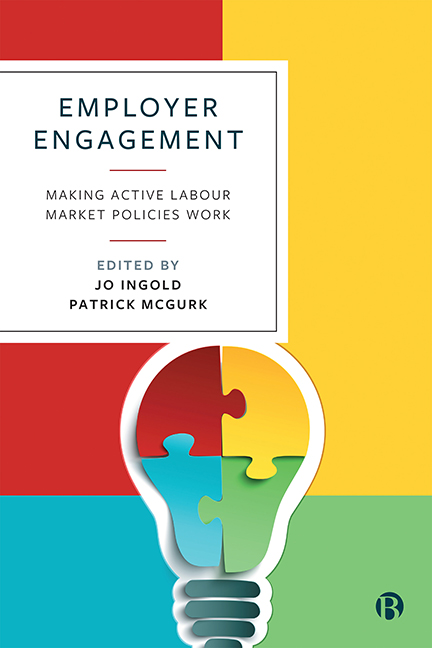Book contents
- Frontmatter
- Contents
- List of Figures and Tables
- List of Abbreviations
- Notes on Contributors
- Acknowledgements
- 1 Introduction: Why Is Employer Engagement Important?
- Part I The Macro Level: Political Economy and Policies
- Part II The Meso Level: Programmes and Actors
- Part III The Micro Level: Workplaces and Their Contexts
- Index
5 - Practice Case Study: Programme Commissioning and Co-opetition in the UK and Australia
Published online by Cambridge University Press: 18 January 2024
- Frontmatter
- Contents
- List of Figures and Tables
- List of Abbreviations
- Notes on Contributors
- Acknowledgements
- 1 Introduction: Why Is Employer Engagement Important?
- Part I The Macro Level: Political Economy and Policies
- Part II The Meso Level: Programmes and Actors
- Part III The Micro Level: Workplaces and Their Contexts
- Index
Summary
Introduction
The UK and Australia have similar employment service systems dominated by an outsourced model of service delivery. In the UK, this began with private sector-led New Deals from 1998 and was further consolidated under the Work Programme 2011–17 and the Work and Health Programme from 2017. In Australia this occurred with the dismantling of the Commonwealth Employment Service in 1998 and the formation of a network of employment service providers – Job Network, then Job Services Australia and most recently jobactive and Workforce Australia. Collaboration between employment service providers has not been a feature of either model as the contracting regime and payment models have effectively discouraged this by encouraging intense competition between service providers (Ingold and Stuart, 2015). Also, commissioners do not account for employers as key stakeholders in either commissioning or contract management. Given the importance of employer engagement to the success of programmes, the commissioning landscape means that providers must ‘retrofit’ their delivery to efficiently and effectively service employers in a competitive environment comprising multiple programmes and providers in the same geographies with siloed caseloads all approaching the same employers (Ingold and Carr, 2020). This chapter compares approaches in the UK and Australia to improve the servicing of employers’ needs through collaboration. In the UK, the ReAct Partnership, aligned to Restart from 2021, and in Australia the Magpies Next Generation Local Jobs Program are examined.
Paths to collaboration in the UK and Australia
Earlier developments in the UK
There have been two important bases for attempts at collaboration amongst the employment services sector in the UK. Firstly, the growing evidence that to service both jobseekers and employers as key customers of employment services requires collaboration between providers. Evidence suggests that if employers’ requirements are greater than one provider can meet, there is a good case for collaboration, or providers risk losing immediate and future job opportunities from employers (Ingold and Stuart, 2014, p 8). In practical terms, providers can only place customers they have been assigned, meaning the available labour pool is spread across many providers. This means that an employer recruiting from one provider will not hear about all the available jobseekers in that area.
- Type
- Chapter
- Information
- Employer EngagementMaking Active Labour Market Policies Work, pp. 75 - 84Publisher: Bristol University PressPrint publication year: 2023



